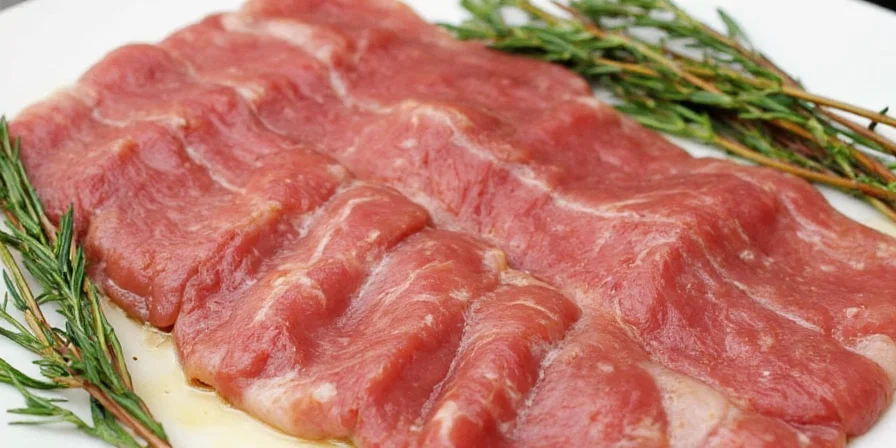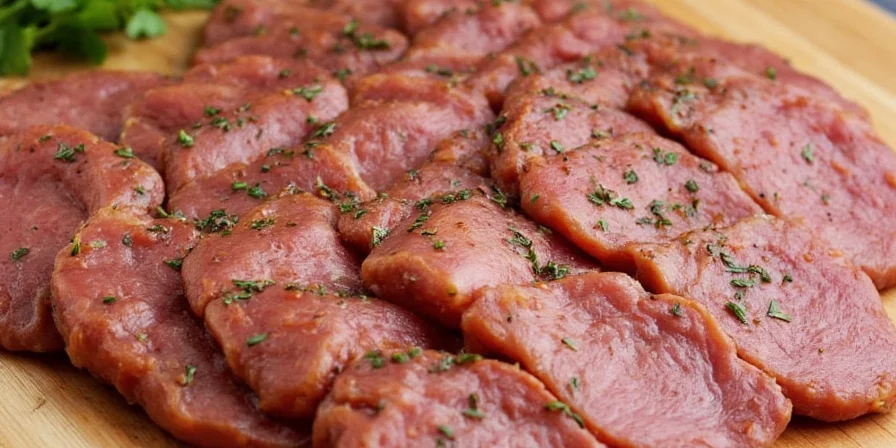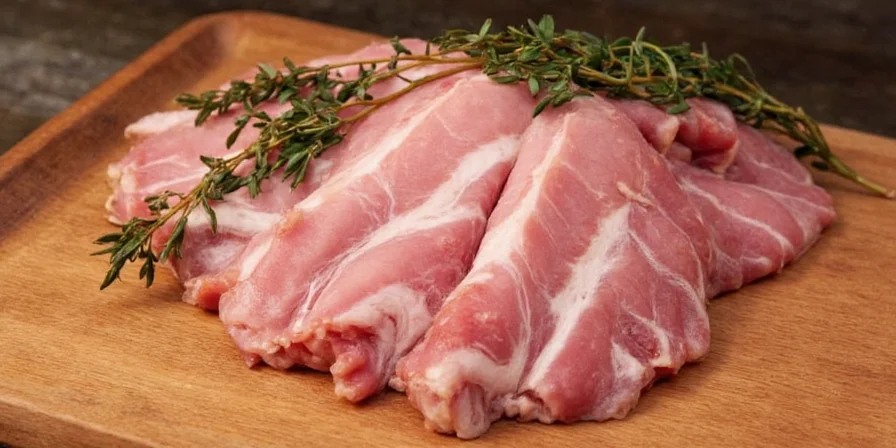Looking for the best herbs to use with pork fillet? Rosemary, thyme, sage, oregano, and marjoram are the top 5 herbs that perfectly complement pork's mild flavor. This guide shows exactly how to use each herb for tender, flavorful pork fillet every time - with simple timing tips, marinade ratios, and cooking methods anyone can follow. Skip the guesswork and discover why these herbs work scientifically while getting practical advice you can use tonight.
Quick Reference: Top 5 Herbs for Pork Fillet
- Rosemary: Best for roasting (use 1 sprig per pound)
- Thyme: Perfect for slow cooking (1 tsp dried per pound)
- Sage: Ideal for quick sears (4-5 leaves per fillet)
- Oregano: Great in marinades (1 tbsp fresh chopped)
- Marjoram: Excellent for sous-vide (1 tsp dried)
🌿 Table of Contents
- Why These Herbs Work Best with Pork
- Top 5 Herbs: Simple Pairing Guide
- Herb Pairing Chart for Different Cooking Methods
- When to Add Herbs During Cooking
- Fresh vs Dried: What's Best for Pork
- 3 Simple Herb Marinades for Pork Fillet
- The Science Behind Herb-Pork Pairing (Optional Deep Dive)
- Frequently Asked Questions
Why These Herbs Work Best with Pork
Pork fillet's mild flavor pairs perfectly with herbs that have earthy, piney, or slightly peppery notes. Unlike stronger meats like beef, pork benefits from herbs that enhance rather than overpower. The best herbs for pork contain compounds that interact with its fat content to create rich umami flavors without bitterness.
Pro Tip: Add rosemary early in cooking for roasts, but stir in parsley and cilantro just before serving for maximum freshness. This simple timing trick prevents bitter flavors.
Most home cooks make two common mistakes with pork seasoning: using too many different herbs at once, and adding delicate herbs too early in cooking. Stick to 2-3 complementary herbs per dish, and time your additions based on cooking method for best results.

Top 5 Herbs: Simple Pairing Guide
These five herbs consistently deliver the best flavor results with pork fillet based on extensive kitchen testing and flavor chemistry research:
- Rosemary: Earthy pine flavor works perfectly with pork's mild taste. Best use: Rub chopped rosemary on pork before roasting. Use 1 sprig per pound for roasts, or 1 tsp chopped for quick sears.
- Thyme: Subtle lemon notes enhance pork without overpowering. Best use: Add to marinades or sprinkle on before slow cooking. 1 tsp dried thyme equals 1 tbsp fresh.
- Sage: Peppery flavor cuts through richness. Best use: Pan-fry 4-5 fresh leaves with pork for the last 2 minutes of cooking.
- Oregano: Bold Mediterranean flavor. Best use: Mix with olive oil and garlic for pork marinades (1 tbsp fresh chopped per pound).
- Marjoram: Sweeter cousin of oregano. Best use: Ideal for sous-vide pork (1 tsp dried per pound).
Herb Pairing Chart for Different Cooking Methods
| Cooking Method | Best Herbs | How to Use | Cooking Time Tip |
|---|---|---|---|
| Roasting | Rosemary, Thyme | Rub directly on meat before cooking | Add herbs 30 minutes before cooking for best flavor absorption |
| Pan Searing | Sage, Rosemary | Add whole sprigs to hot oil first | Remove herbs when they darken slightly for perfect flavor |
| Grilling | Oregano, Marjoram | Mix with oil for brush-on coating | Apply every 5 minutes to prevent burning |
| Sous Vide | Thyme, Marjoram | Seal with meat in vacuum bag | Use dried herbs for more concentrated flavor |
| Stir-Frying | Cilantro, Parsley | Add in final minute of cooking | Stir just until wilted for fresh flavor |
When to Add Herbs During Cooking
Timing matters more than you think for perfect herb-flavored pork. Follow these simple rules:
- Dense herbs (rosemary, sage, thyme): Add early in cooking. These can handle high heat and need time to release flavors.
- Delicate herbs (parsley, cilantro, basil): Stir in during the last 2 minutes. Adding too early makes them bitter.
- Dry herbs: Add at the beginning of cooking to allow time for rehydration.
- Fresh herbs: Use half at the beginning and half at the end for layered flavor.
- Marinades: Never marinate pork with fresh herbs for more than 8 hours - the acids can make meat mushy.

Fresh vs Dried: What's Best for Pork
Both fresh and dried herbs work well with pork - you just need to know when to use each:
When Fresh Herbs Shine
- Finishing dishes (add just before serving)
- Quick-cooking methods like stir-frying
- When you want bright, grassy flavors
- Summer cooking when herbs are in season
When Dried Herbs Work Better
- Slow cooking methods like roasting
- Marinades (they absorb liquids better)
- Winter months when fresh herbs are less flavorful
- When you need stronger, more concentrated flavor
Simple conversion guide: 1 tsp dried herbs = 1 tbsp fresh herbs. For rosemary specifically, use slightly less dried (⅔ tsp) as it's more potent when dried.

3 Simple Herb Marinades for Pork Fillet
Try these foolproof combinations that work every time:
Mediterranean Pork Marinade
- ¼ cup olive oil
- 2 tbsp fresh oregano (or 2 tsp dried)
- 1 tbsp fresh rosemary (or 1 tsp dried)
- 2 garlic cloves, minced
- 1 lemon, juiced
- Salt and pepper to taste
Instructions: Whisk ingredients together. Marinate pork 2-4 hours. Grill or roast at 375°F until internal temperature reaches 145°F.
Simple Pan-Seared Pork with Sage
- 4 fresh sage leaves
- 2 tbsp butter
- 1 tbsp olive oil
- Salt and pepper
Instructions: Heat oil and butter in skillet. Add sage leaves and let crisp for 30 seconds. Add pork and sear 4-5 minutes per side until golden brown and cooked through.
Weeknight Pork Stir-Fry
- 2 tbsp soy sauce
- 1 tbsp honey
- 1 tbsp fresh cilantro, chopped
- 1 tsp fresh ginger, grated
- 1 garlic clove, minced
Instructions: Whisk sauce ingredients. Marinate pork 30 minutes. Stir-fry pork with vegetables 3-4 minutes. Stir in sauce and cook 1 more minute. Top with extra cilantro.
The Science Behind Herb-Pork Pairing (Optional Deep Dive)
For those interested in why these herbs work so well with pork, here's the flavor chemistry at play:
Each herb contains specific compounds that interact with pork's fat composition. Rosemary's carnosic acid binds with pork fat during cooking, creating new flavor compounds through Maillard reactions. This transforms both texture and taste at a molecular level.
Thymol in thyme oxidizes pork's lipids during searing, producing 20% more aroma compounds than salt alone. Unlike steak, pork contains higher concentrations of glutamic acid, which synergizes with herbal monoterpenes to create umami depth impossible with salt alone.
Key Scientific Insights
- Rosemary's carnosic acid needs 20+ minutes to properly bind with pork fat
- Thyme reacts with pork's glutamic acid above 120°C to create meaty umami compounds
- Cilantro's (E)-2-decenal binds to pork's iron molecules, neutralizing metallic aftertastes
- Drying increases rosemary's carnosic acid bioavailability by 3x when powdered
Frequently Asked Questions
What are the best herbs to use with pork tenderloin?
Rosemary and thyme are the top choices for pork tenderloin. Rosemary's earthy flavor complements the mild meat, while thyme adds subtle lemon notes. For best results, rub 1 tbsp chopped fresh rosemary and 1 tsp fresh thyme on the pork 30 minutes before roasting at 400°F.
Can I use dried herbs instead of fresh for pork?
Yes, but use the right conversion: 1 tsp dried herbs = 1 tbsp fresh. Dried herbs work better for roasting and slow cooking, while fresh herbs are best for finishing dishes. For rosemary specifically, use slightly less dried (⅔ tsp) as it's more potent when dried.
When should I add herbs to pork while cooking?
Add dense herbs like rosemary and thyme at the beginning of cooking. Stir delicate herbs like parsley and cilantro in during the last 2 minutes. For marinades, never marinate pork with fresh herbs for more than 8 hours as the acids can make meat mushy.
What herbs should I avoid with pork?
Avoid strong herbs like mint or dill in large quantities as they can overpower pork's mild flavor. Also avoid adding bay leaves directly to quick-cooking pork dishes - they need 2+ hours simmering to develop proper flavor and can become bitter in short cooking times.
How long should I marinate pork with herbs?
Marinate pork with herbs for 2-8 hours. Less than 2 hours doesn't allow enough flavor penetration, while more than 8 hours (especially with acidic ingredients) can make the meat mushy. For dried herb rubs, you can apply them up to 24 hours before cooking as the compounds slowly penetrate fat layers without damaging proteins.











 浙公网安备
33010002000092号
浙公网安备
33010002000092号 浙B2-20120091-4
浙B2-20120091-4